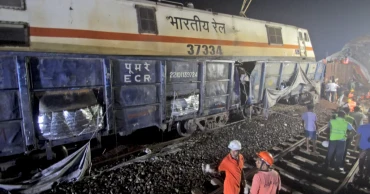India train accident
Indian authorities arrest 3 railway officials over the train crash that killed more than 290 people
India’s federal crime agency said Friday (July 07, 2023) it has arrested three railway officials in connection with one of the country’s deadliest train accidents, which killed more than 290 people last month.
The arrested men have been charged with culpable homicide without murder and destruction of evidence, the Central Bureau of Investigation said in a statement. It identified them as two signal engineers and one technician, and said the investigation is ongoing.
Error in signaling system led to train crash that killed 275 people in India, official says
June’s train crash in eastern Odisha state occurred when a packed passenger train was mistakenly diverted onto an adjacent loop line where it rammed into a stationary freight train loaded with iron ore. The collision derailed the passenger train’s coaches onto another track where they struck a passing train that was running in the opposite direction.
The two passenger trains were carrying more than 2,290 people when the collision took place. Nearly 1,000 people were injured.
India’s deadly train crash renews questions over safety as government pushes railway upgrade
After the accident, India’s Railway Minister Ashwini Vaishnaw said the cause of the crash was related to the signaling system.
India, a country of 1.42 billion people, has one of the world’s most extensive and complicated railways built during the British colonial era: more than 40,000 miles (64,000 kilometers) of tracks, 14,000 passenger trains and 8,000 stations. Spread across the country from the Himalayas in the north to the beaches in the south, it is also a system that is weakened by decades of mismanagement and neglect.
Despite efforts to improve safety, several hundred accidents happen every year, and most such crashes are blamed on human error or outdated signaling equipment.
Indian officials end rescue work for 2 wrecked passenger trains that killed over 300 people
The June crash was India’s deadliest since 1995, when two trains collided near New Delhi, killing 358 people. In 2016, a passenger train slid off the tracks between the cities of Indore and Patna, killing 146 people.
2 years ago
Error in signaling system led to train crash that killed 275 people in India, official says
The derailment in eastern India that killed 275 people and injured hundreds was caused by an error in the electronic signaling system that led a train to wrongly change tracks and crash into a freight train, officials said Sunday.
Authorities worked to clear the mangled wreckage of the two passenger trains that derailed Friday night in Balasore district in Odisha state in one of the country’s deadliest rail disasters in decades.
An Odisha government statement revised the death toll to 275 after a top state officer put the number at over 300 on Sunday morning. The officer spoke on condition of anonymity as he was not authorized to speak to reporters.
Jaya Verma Sinha, a senior railway official, said the preliminary investigations revealed that a signal was given to the high-speed Coromandel Express to run on the main track line, but the signal later changed, and the train instead entered an adjacent loop line where it rammed into a freight loaded with iron ore.
Read: India’s deadly train crash renews questions over safety as government pushes railway upgrade
The collision flipped Coromandel Express’s coaches onto another track, causing the incoming Yesvantpur-Howrah Express from the opposite side also to derail, she said.
The passenger trains, carrying 2,296 people, were not overspeeding, she said. Trains that carry goods are often parked on an adjacent loop line so the main line is clear for a passing train.
Verma said the root cause of the crash was related to an error in the electronic signaling system. She said a detailed investigation will reveal whether the error was human or technical.
The electronic interlocking system is a safety mechanism designed to prevent conflicting movements between trains. It also monitors the status of signals that tell drivers how close they are to a next train, how fast they can go and the presence of stationary trains on the track.
Read more: No more survivors found after India train crash kills over 280, injures 900; Modi heads to site
“The system is 99.9% error free. But 0.1% chances are always there for an error,” Verma said. To a question whether the crash could be a case of sabotage, she said “nothing is ruled out.”
On Sunday, a few shattered carriages, mangled and overturned, were the only remnants of the tragedy. Railway workers toiled under the sun’s glare to lay down blocks of cement to fix the broken tracks. A crew with excavators was removing mud and the debris to clear the crash site.
At one of the hospitals nearly 15 kilometers (9 miles) from the site, survivors spoke of the horror of the moment of the crash.
Pantry worker Inder Mahato could not remember the exact sequence of events, but said he heard a loud bang when the Coromandel Express crashed into the freight. The impact caused Mahato, who was in the bathroom, to briefly lose consciousness.
Read: India train crash: some Bangladeshis suffered minor injuries, says deputy high commission
Moments later when he opened his eyes, he saw through the door that was forced open people writhing in pain, many of them already dead. Others were frantically trying to get out from the twisted wreckage of his rail car.
For hours, Mahato, 37, remained stuck in the train’s bathroom, before rescuers scaled up the wreckage and pulled him out.
“God saved me,” he said, lying on the hospital bed while recuperating from a hairline fracture in his sternum. “I am very lucky I am alive.”
Mahato’s friends weren’t so lucky. Four of them died in the crash, he said.
Meanwhile, many desperate relatives were struggling to identify the bodies of their loved ones because of the gruesomeness of the injuries. Few others were searching hospitals to check whether their relatives were alive.
Read: Indian railways minister says signaling system error led to crash that killed over 300 people
In the same hospital where Mahato was recovering from his injuries, Bulti Khatun roamed outside the premises in a dazed state, holding an identity card of her husband who was onboard the Coromandel Express and traveling to southern Chennai city.
Khatun said she visited the morgue and other hospitals to look for him, but was unable to find him.
“I am so helpless,” she said, sobbing.
Fifteen bodies were recovered on Saturday evening and efforts continued overnight with heavy cranes being used to remove an engine that settled on top of a rail car. No bodies were found in the engine and the work was completed on Sunday morning, said Sudhanshu Sarangi, director-general of fire and emergency services in Odisha.
Read more: India train accident: 2 Bangladeshis receiving treatment in hospital, says deputy high commissioner
The crash occurred at a time when Prime Minister Narendra Modi is focusing on the modernization of the British colonial-era railroad network in India, which has become the world’s most populous country with 1.42 billion people. Despite government efforts to improve safety, several hundred accidents occur every year on India’s railways, the largest train network under one management in the world.
Modi visited the crash site on Saturday and talked to rescue officials. He also visited a hospital to inquire about the injured, and spoke to some of them.
Modi told reporters he felt the pain of the crash victims. He said the government would do its utmost to help them and strictly punish anyone found responsible.
In 1995, two trains collided near New Delhi, killing 358 people in one of the worst rail accidents in India. In 2016, a passenger train slid off the tracks between the cities of Indore and Patna, killing 146 people.
Most such accidents in India are blamed on human error or outdated signaling equipment.
Read more: Indian officials end rescue work for 2 wrecked passenger trains that killed over 300 people
About 22 million people ride 14,000 trains across India every day, traveling on 64,000 kilometers (40,000 miles) of track.
2 years ago
Indian officials end rescue work for 2 wrecked passenger trains that killed over 300 people
With rescue work finished, authorities began clearing the mangled wreckage of two passenger trains that derailed in eastern India, killing more than 300 people and injuring hundreds in one of the country’s deadliest rail accidents in decades, officials said Sunday (June 4, 2023).
Investigators are looking into possible causes behind Friday (June 2, 2023) night’s crash in Balasore district of eastern Odisha state, including whether human error or signal failure played a role.
Fifteen bodies were recovered on Saturday evening and efforts continued overnight as heavy cranes were used to remove an engine that had settled on top of a rail car. No bodies were found in the engine and the work was completed on Sunday morning, said Sudhanshu Sarangi, director-general of fire and emergency services in Odisha.
Read more: India train accident: 2 Bangladeshis receiving treatment in hospital, says deputy high commissioner
2 years ago
India train accident: 2 Bangladeshis receiving treatment in hospital, says deputy high commissioner
Two Bangladeshis were hospitalized with injuries following Friday’s (June 2, 2023) train crash in India, Andalib Elias, deputy high commissioner at the Bangladesh Deputy High Commission in Kolkata, said.
“We do not have any information about any deceased Bangladeshis; what we know so far is two Bangladeshi injured passengers are currently undergoing treatment in two hospitals in Odisha,” he said in a video message.
Also read: India train crash kills over 280, injures 900 in country's deadliest rail accident in decades
“Also families of four train passengers contacted us from Bangladesh and said they (the four Bangladeshis) are still missing. We are trying to trace them and already a team from the Kolkata deputy high commission went to the accident site this morning. Hopefully after reaching there they will coordinate with the injured Bangladeshis there,” he added.
The mission provided an emergency Whatsapp number: +919038353533 for further assistance.
Aslo read: Train accident in Odisha: Hotline opened for query about Bangladeshis
Rescuers found no more survivors in the overturned and mangled wreckage of two passenger trains that derailed in eastern India, killing more than 280 people and injuring hundreds in one of the country’s deadliest rail crashes in decades, AP reported.
Also read: India train crash: some Bangladeshis suffered minor injuries, says deputy high commission
2 years ago
India train crash death toll rises above 230 with 900 injured as rescuers comb through debris
Rescuers waded through piles of debris and wreckage to pull out bodies and free people after two passenger trains derailed Friday night in India, killing more than 230 people and leaving hundreds of others trapped inside more than a dozen mangled rail cars, in one of the country's deadliest train crashes in decades.
The accident, which happened about 220 kilometers (137 miles) southwest of Kolkata, led to a chaotic scene as rescuers climbed atop the wrecked trains to break open doors and windows using cutting torches to free survivors.
About 900 people were injured in the accident in Balasore district in the eastern state of Odisha, said P.K. Jena, the state's top administrative official. The cause was under investigation.
Ten to 12 coaches of one train derailed, and debris from some of the mangled coaches fell onto a nearby track, said Amitabh Sharma, a railroad ministry spokesperson.
The debris was hit by another passenger train coming from the opposite direction, causing up to three coaches of the second train to also derail, Sharma said.
Also read: Passenger train derails in India, killing at least 50 and trapping many others
A third train carrying freight was also involved, the Press Trust of India reported, but there was no immediate confirmation from railroad authorities. PTI said some of the derailed passenger coaches hit cars from the freight train.
The death toll rose steadily throughout the night. As dawn approached on Saturday, Jena said that at least 233 people were dead. In the aftermath, scores of dead bodies lay on the ground near the train tracks covered by white sheets, as locals and rescuers raced to help survivors.
Television footage on Saturday morning showed teams of rescuers and police sifting through the ruins as the search operation carried on. Scores of people also showed up at a local hospital to donate blood.
Officials said 1,200 rescuers worked with 115 ambulances, 50 buses and 45 mobile health units through the night at the accident site. Saturday was declared as a day of mourning in the state.
Villagers said they rushed to the site to evacuate people after hearing a loud sound created by the train coaches going off the tracks.
"The local people really went out on a limb to help us. They not only helped in pulling out people, but retrieved our luggage and got us water," PTI cited Rupam Banerjee, a survivor, as saying.
Passenger Vandana Kaleda said that inside the train during the derailment people were "falling on each other" as her coach shook violently and veered off the tracks.
"As I stepped out of the washroom, suddenly the train tilted. I lost my balance. ... Everything went topsy turvy. People started falling on each other and I was shocked and could not understand what happened. My mind stopped working," she said, adding she felt lucky to survive.
Another survivor who did not give his name said he was sleeping when the impact woke him up. He said he saw other passengers with broken limbs and disfigured faces.
The derailed Coromandel Express was traveling from Howrah in West Bengal state to Chennai, the capital of southern Tamil Nadu state, PTI said.
Indian Prime Minister Narendra Modi said his thoughts were with the bereaved families.
"May the injured recover soon," tweeted Modi, who said he had spoken to the railway minister and that "all possible assistance" was being offered.
Despite government efforts to improve rail safety, several hundred accidents occur every year on India's railways, the largest train network under one management in the world.
In August 1995, two trains collided near New Delhi, killing 358 people in one of the worst train accidents in India in decades.
In 2016, a passenger train slid off the tracks between the cities of Indore and Patna, killing 146 people.
Most train accidents are blamed on human error or outdated signaling equipment.
More than 12 million people ride 14,000 trains across India every day, traveling on 64,000 kilometers (40,000 miles) of track.
2 years ago









